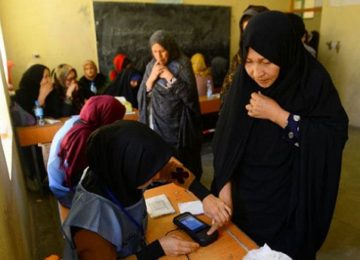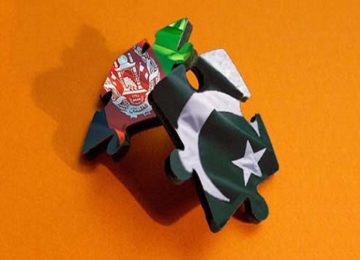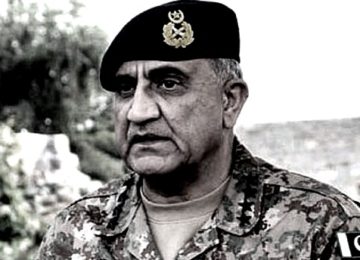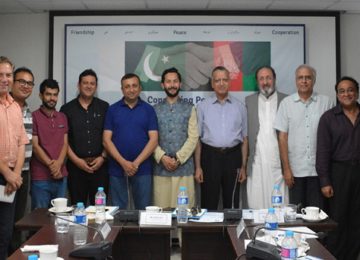Former US Diplomat Ronald E. Neumann, in his opinion piece ‘The Ghazni Battle: A need for serious answers’, has questioned the US security approach in Afghanistan after the Taliban were pushed out of Ghazni. Neumann has formerly served as the U.S. ambassador to Algeria, Bahrain and Afghanistan, the latter from 2005-2007. He argues that reports from the battlefield suggest that a there was a breakdown in command, with the Afghan police, intelligence services and the army not supporting each other. Moreover, the forces were asking for help and not getting it. With lessons learned after the Ghazni battle, Neumann argues that until we (the US) have fact-based answers to guide our actions, both rapid policy decisions and the speculation of the commentariat are a waste of time.
Find the full piece below:
The Ghazni battle: A need for serious answers
BY RONALD E. NEUMANN
The battle for the Afghan city of Ghazni is over. That an important provincial city was largely captured is more important in the minds of vulnerable Afghans than that the Taliban were driven out. Now, important questions need to be answered. And the answers need to result in action.
After 17 years of war, many people have their minds made up. Those who consider the war lost will rush to find proof of that in the battle. Those who defend the war are likely to point out that the new strategy of building Afghan forces has barely begun and that the Taliban were driven out with serious losses. Neither of these viewpoints is worth much without a serious consideration of what happened and what needs to be done.
The Obama administration put money and equipment into building the Afghan forces but denied the time or personnel needed to give the effort a chance. Only 50 percent of required training teams were ever fielded and the major training effort lasted barely three years, scarcely time to more than double the Afghan forces. The current strategy wants to take the time to train and repair the mistakes of the past. Fielding the current, largely U.S. training force took time, and the real effort has been under way only a few months, far too short a period to judge whether increased training can make a difference on the battlefield. But training can make a difference only if the will to use it is present in the Afghans. Ghazni raises disturbing questions.
I certainly do not have a full picture of what happened. But fragments I hear from Afghans, and what I read, are disturbing: a breakdown in command, Afghan police, intelligence services and the army not supporting each other; forces asking for help and not getting it. The stories are anecdotal fragments but they suggest a wide-scale breakdown in command and control. It is possible that some units failed to fight well, but this is unconfirmed. There are other news stories of small Afghan bases overrun in the north and east. In these cases also, requests for help are said to have gone unanswered.
These are first impressions, and those are often wrong in Afghanistan. Calls for help sometimes have been exaggerated by local commanders to gain extra supplies or equipment. But the stories are all too similar to the accounts that came out of the fall of the city of Kunduz three years ago. If these stories are correct, then there seems to have been little improvement in the Afghan command. Above all, they suggest too many officers remain failures. If that persists, then the war eventually will be lost.
Now is the time for answers to very fundamental questions.
On the side of the Afghan security forces and NATO, will there be a ruthless after-action appraisal? Will lessons be drawn and fundamental changes undertaken to improve? This could be a moment of great learning and realistic appraisal of what needs to be done. But that has not happened in the past. There are some really competent Afghan commanders, but they must be put in charge and supported, not micro-managed, especially for political reasons, as they improve their commands. Those who fail the test of leadership and efficiency need to be rooted out by the Afghan government and command, but the civilian government must avoid micro-management. The government of President Ashraf Ghani needs to hold the security services responsible but not seek to manage too much from Kabul.
On the side of the Taliban, what lessons are drawn? If they had high casualties, is morale up or down? Can they just go on repeating this sort of attack? And, what were their goals? Did they just want a political victory, which they got, although perhaps at a high cost? Did they think they could hold the town? Why did they stay and take losses in the last days of fighting? If we don’t figure out fact-based answers to some of these questions, and instead just make assumptions, our policy responses risk being seriously wrong.
Lastly, there is the issue of what the outcome in Ghazni might mean for peace. Is it a Taliban rejection? Is it positioning for starting talks from a stronger position? Speculating about these important questions without solid evidence is foolish. We need to keep the questions open while we work on both fighting and talking.
In short, there is a great deal we need to learn. There even may be opportunity to correct fundamental problems and adjust policy. But until we have fact-based answers to guide our actions, both rapid policy decisions and the speculation of the commentariat are a waste of time.
The author Ronald E. Neumann, a former infantry officer in Vietnam, is president of the American Academy of Diplomacy. He was U.S. ambassador to Algeria, Bahrain and Afghanistan, the latter from 2005-2007. He has made many visits back since.
Original Source: The Hill
Disclaimer: Views expressed on this blog are not necessarily endorsed or supported by the Center for Research and Security Studies, Islamabad.








